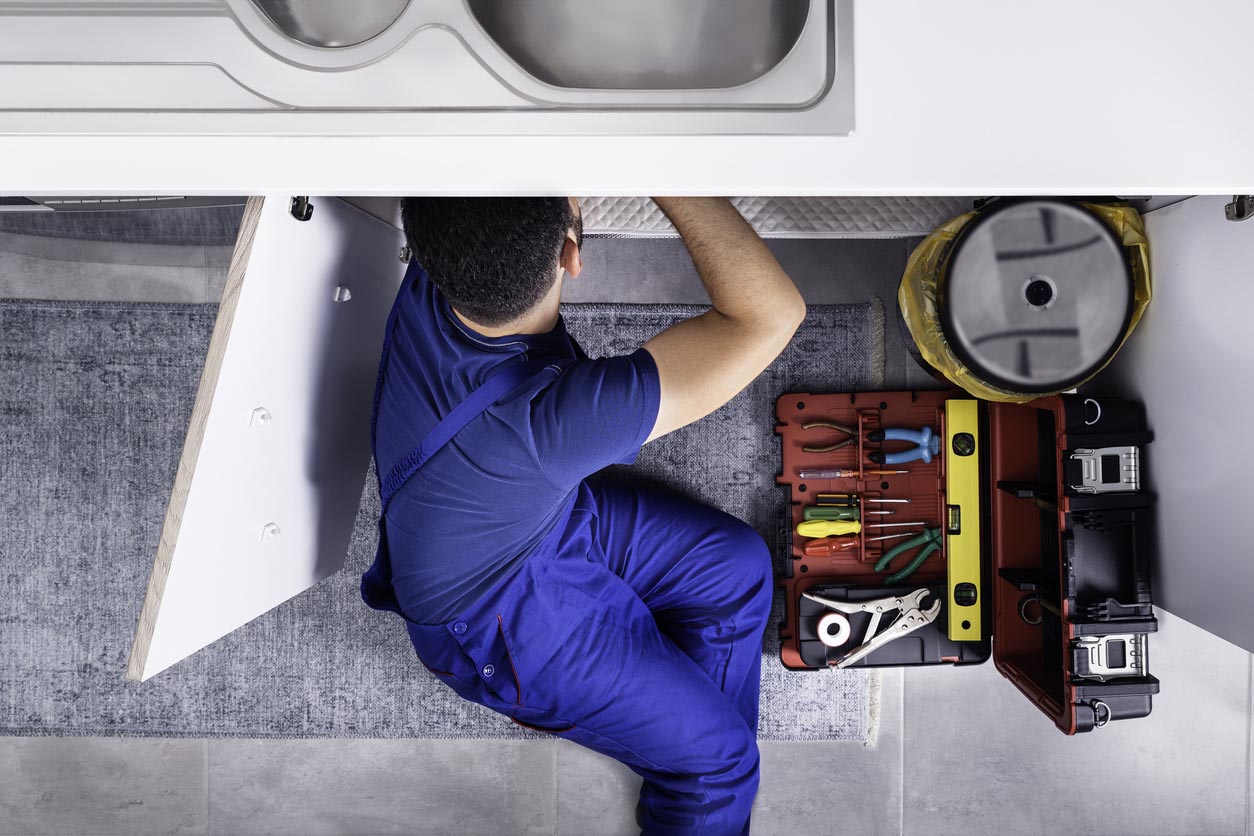We may earn revenue from the products available on this page and participate in affiliate programs. Learn More ›
Oftentimes, DIY home improvement projects have an allure to them. They seem easy to tackle with the right tools and the right amount of time, and there’s less sticker shock associated. And sometimes, with the right skills and materials, they can be done with ease. However, doing these projects yourself may not always be the best option. Professional contractors with years of experience can rely on their skill set to complete jobs in less time and with more safety measures in place to ensure work is done according to code. Hiring an expert could also save more money in the long run in case a botched DIY job requires correcting or results in damages to the home. Either way, it’s a good idea to assess the skill level associated with the project before making a decision on whether to DIY or hire a pro.
Difficulty: Intermediate to expert. DIY home improvement can cover a wide range of projects, from replacing light fixtures to installing board and batten or putting in new plumbing. In any case, a job that requires more than simple cosmetic updates, such as painting a room or hanging new curtains, requires at minimum intermediate knowledge and experience.
When to DIY

In certain scenarios, you may be perfectly capable of taking on home improvement tasks without the help of an expert. If you have the skill set, time, tools, and budget required, you can consider the job yours. You’ll not only save money but also build your experience, confidence, and skill level to take on bigger tasks in the future. However, be advised that the results may not look as professional as the photo you saved for inspiration. And it may take several trips to the home improvement store before the task is truly complete. You’ll know you can DIY home improvement when:
You are already familiar with the project or completing it falls within your skill set.
Improvements such as putting on a fresh coat of paint, hanging curtain rods, or assembling furniture can often be tackled with simple instructions or manuals. These tasks usually fall within the skill sets of beginning or intermediate DIYers who want to make meaningful changes without putting forth maximum effort. These home improvements likely cost less, too, and require fewer tools to complete. If the project you wish to undertake is something you’re familiar or comfortable with, enlisting the help of a professional may not be necessary. Instead, basic instructions or tutorials from home bloggers or YouTube videos should suffice.
You already have or can easily acquire the tools to complete this project.
Drill? Check. Paint sprayer? Check. Hammer and nails? Check, check. Compared to heavy-duty power tools, small tools like these don’t usually cost a fortune and are easy to use, even for people who don’t attempt DIY projects regularly. You may already own these tools, and if you don’t, they’re easy to pick up from your local home improvement store or even borrow from neighbors and family members who likely have them on hand. In both cases, the overall expense is likely to be low enough to justify doing the job yourself. Unless the task calls for an expensive, complicated tool that you haven’t used before or don’t plan on using again, you’re just steps away from calling your home improvement project complete.
The price for professional work exceeds your budget.
In some cases, you may not be able to stretch your budget enough to hire an experienced contractor. Instead, you’ll need to lean on your own experience to improve your home on your own. The cost of labor can add up quickly, so completing the project solo can reduce expenses from the get-go. This is likely good for your pocketbook, but it could put a damper on the free weekend you hoped to spend binge-watching a new show or meeting up with friends and family. When the job is done, however, it’s probable you’ll have improved your home’s value and your DIY skill set, too.
You have enough time to dedicate to the project.
The home improvement project you hope to complete will likely take longer than you anticipate, especially if you decide against hiring a professional. If you do it on your own, it’s recommended that you carefully consider the amount of time you’re willing to dedicate to DIY home improvement, since taking a slower pace will allow for fewer mistakes. Multiple trips to the home improvement store or correcting miscalculations or measurements can all add to the total timeline you’ve allotted.
Making mistakes won’t be costly.
Mistakes are inevitable when it comes to DIY projects. The question is not whether you will make them, but how costly they will be in the end. Basic cosmetic changes are less likely to cost a lot of money if the error is a nail hole that’s too low or brushstrokes that can be painted over. Unless the task you hope to take on is extensive, you probably won’t spend an arm and a leg correcting minor mistakes that the average visitor or potential buyer won’t see. To cut down on potential errors, however, it would be wise to watch tutorials and listen to the advice of experts who have learned from previous mishaps.
The result doesn’t have to be perfect.
Smaller, less impactful jobs that won’t drastically impact the value of the home are an excellent place to start when going the DIY route. Chances are if it’s a project you haven’t done before, errors will occur. Tiles may not be laid perfectly straight, paint brushstrokes may be visible, and the list goes on. Fortunately, these small mistakes don’t bring down the value of the home and can be easily corrected over time. Your skills won’t be as developed as a professional’s, so it’s reasonable to expect that things won’t go exactly as planned or look as perfect as your inspiration.

When to Hire a Professional
Regardless of how much research you may have put into a DIY job, some projects are simply better left to the pros. If the task at hand necessitates permits, is dangerous to you or your home, or requires skills and tools that you don’t have, it may be time to call in an expert. By doing so, you eliminate the risk of shoddy work and potentially damaging outcomes that could cost more than you planned. Licensed contractors have years of experience and skills that they can apply to your specific needs as opposed to the blog posts or YouTube videos you may rely on to assist your DIY efforts. When it comes to the value and safety of you and your home, your best bet is to rely on help from an expert.
The project requires permits.
Depending on what area of the country you live in, permits may be required for major electrical or structural work to your home. It would be wise to first contact your city government office to determine the regulations concerning home improvements. Local contractors are also a helpful resource to figure out which remodel licenses may be required. If the job you’re considering taking on needs specialized training or permits, it’s better to leave it to the professionals, who have been through the permit-acquiring process before. This way, you can lean on their prior experience to ensure the project runs smoothly and stays on course.
The project involves electrical, plumbing, or HVAC work.
Experts in electrical, plumbing, and HVAC work have gone through hours of training to receive licenses that allow them to fix or upgrade residential and commercial properties. Enlisting their expertise is essential if the project you have in mind requires new wiring, updated pipes, or improvements to your heating and air conditioning systems. Attempting to make those changes yourself could result in costly mistakes that could have been prevented if a professional had been contacted first. Faulty wiring, collapsed walls, gas leaks, and other major disasters are at stake if you attempt to fix what an expert could handle for you. Plus, you’re likely to spend more money in the long run repairing damages incurred through DIY projects.
You can get hurt during the project.
No DIY home improvement project is worth risking your personal safety, even if it has the potential to save you money. Botched electrical jobs or other similar mistakes could result in damage to you and your property, which will only add to your expenses. Professional contractors with licenses will also have insurance and warranties in place to ensure their work is covered in case anything dangerous does happen to you or your home. If you take on a project that leads to injury or significant damages, you may not be as lucky.
A less-than-perfect job can hurt your home’s value.
Whether you plan to sell your home down the line or not, a botched DIY home improvement job has the potential to hurt more than your budget. In fact, it could hurt your home’s value, which may be even more detrimental to your pocketbook. It’s no big deal if your paint job isn’t perfect; that can easily be corrected. But if shoddy or unfinished work is visible, you can bet the value of your property will decrease as well.
You don’t have the right skills or the right tools.
Certain jobs require experience in order to troubleshoot challenging scenarios or work around roadblocks that may pop up. Without the skills to complete the project, you risk spending more money hiring a professional to correct your mistakes—or worse, damage to your home or injury. It can also be pricey to purchase or rent the tools needed to do the job right. Experience with the right tools is also important, as it adds to the likelihood that your DIY task will look more professional than amateur. Without the skills or tools, you’re better off turning to the pros.
The project requires a lot more time than you can devote to it.
Before you put on your DIY hat, consider the home improvement project you want to get done and the time it would take you to complete. Even if you determine that it won’t take an entire weekend or more, you can bet you’ll come across obstacles that will add to your projected time frame. In most circumstances, a professional will be able to finish the same job in considerably less time, saving you the headache of purchasing or gathering materials or hours of labor that leads to a less-than-stellar result. Plus, you can reinvest your time in other, more suitable projects around the house or spend quality time with friends and family.

Verdict: DIY or Hire a Professional?
Even if you’re convinced you can take on DIY home improvement projects, it’s not uncommon for unexpected costs or complications to creep in once the project begins. These surprises can derail a simple task quickly, leading to more work and less time and money to spend on it. Although cutting costs through DIY is enticing, you may not end up saving as much as you anticipated once the project is over.
Licensed electricians, plumbers, and contractors can handle small to large tasks that improve not only the look and performance of your home, but also its overall value. The experts know what permits to apply for, what codes to abide by, and if something goes wrong, they’ll have insurance and warranties to cover the problem. In the end, their expertise when it comes to using proper materials, tools, and techniques is worth the price for a job well done.
Verdict: Hire a professional
Why Skip DIY Home Improvement
Instead of attempting to save money by doing this project yourself, it would be more beneficial to call in a professional. In all likelihood, the money you thought you’d save by handling it alone will instead go toward materials, or, in a worst-case scenario, toward hiring someone to fix what you botched. By hiring an expert, you can rest assured the job will be done safely and correctly the first time around. In the end, you’ll have more time to focus on smaller, more manageable tasks and leave other DIY home improvement projects to the contractors with years of experience and skill.
Benefits of Hiring a Professional
Besides their expert skill level and years of experience, professional contractors bring other benefits to the table when it comes to DIY home improvement projects. For example:
- They’re licensed. In most cases, contractors go through proper training and testing before they receive licenses that allow them to do the jobs they are hired to complete.
- They’re insured. Insurance helps cover any accidents or damages that may occur throughout the project.
- They offer warranties. If you’re not satisfied with the end result or the work doesn’t hold up over time, warranties are often available to ensure fixes are made.
Overall, your project will be in good hands when a professional is in control. Hiring an expert you trust will likely provide peace of mind and add value to your home.
For professional home improvement, call a HomeAdvisor contractor in your area.


